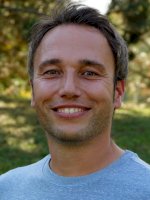
CERBM GIE IGBMC
Illkirch, France
The very first sentence on the WMS homepage reads as follows:
“The World Muscle Society is a dynamic community that aims to promote, disseminate, and share all aspects of neuromuscular physiology and diseases, from basic science to patient care.”
The three keywords promote, disseminate, and share perfectly characterize the WMS community and are the basis of my candidacy for the Executive Board. Since my very first WMS participation in 2009, I am fascinated by the dynamism and the spirit of collaboration between medical practitioners, scientist, and physiotherapists. All are encouraged to openly discuss the lasted findings and to present unpublished data. None can advance without the other, and all contribute to the common aim: to help the patients and families affected by neuromuscular disorders. As a candidate for the WMS election, it is my primary ambition to uphold these values and to pursue the success story of the WMS family as reflected by the major genetic and cell biology discoveries in the past years and the development of various therapeutic concepts.
Another pillar of the WMS community is the promotion of young physicians and scientists. I was honored to receive the young myologist award in 2017, and I am serving as chair of the WMS prize committee since 2020. Helping promising talents to attend the conferences, providing them with the opportunity to present their data, and rewarding their efforts is the best way keep them in the field and to ensure the continuity of the World Muscle Society.
In conclusion, I fully adhere to the triple E values of the society - Education, Enjoyment, and Excitement - and my candidacy stands for teamwork and the promotion of young talents.
I am a research director/professor at the French National Institute of Health and Medical Research (Inserm). From the beginning of my academic career, I was particularly interested in rare diseases, and I joined the Institute of Human Genetics in Freiburg (Germany) for a PhD on malformation disorders in 2004. I was then seeking for a professional experience abroad and the possibility to study a human disorder in its entirety - from gene identification to the development of therapies. The IGBMC in Strasbourg (France) provided an outstanding scientific environment, and my postdoctoral project in the team of Jocelyn Laporte addressed congenital myopathies. At the beginning of the project, the genetic bases of congenital myopathies were barely known, and our team was one of the first to apply innovative next-generation sequencing technologies. I identified several causative genes, provided a molecular diagnosis for numerous affected families, and investigated the pathomechanisms underlying congenital myopathies through functional experiments in cell and animal models. This work resulted in the publication of more than 75 articles (h-index 30), and I obtained tenure track positions as research associate in 2014 and as research director in 2020.
My research focus lies on tubular aggregate myopathy (TAM) and Stormorken syndrome (STRMK). Together with my co-workers, I identified the three known TAM/STRMK genes STIM1, ORAI1, and CASQ1, provided the evidence that the disease is caused by an abnormal regulation of calcium homeostasis, characterized the first mouse model recapitulating the main signs of human disorders, and established therapeutic approaches preventing and reverting disease development.
I am regularly invited by patient associations to present the current knowledge on congenital myopathies in French, German, and English, and to present the challenges of the development of therapeutic approaches. I am also a member of the scientific council of the French Muscular Dystrophy Association (AFM-Téléthon), and I give lectures on medical genetics, cell biology, and muscle disorders at the Strasbourg University.